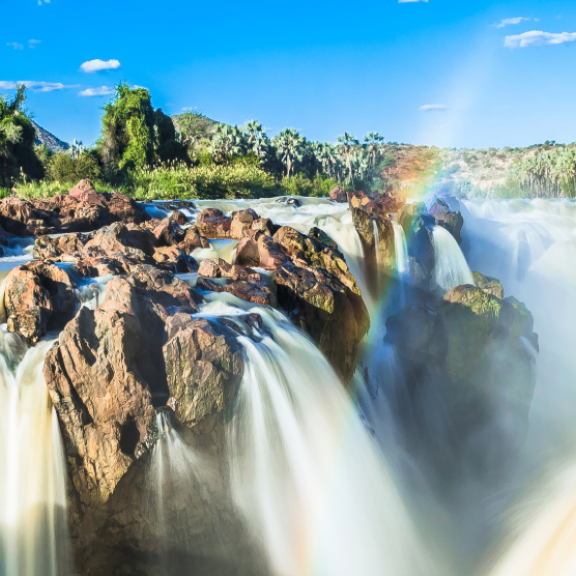
Emigrating to Namibia
Emigrate to Namibia: Find out the most important information for your stay here
Namibia is a country in southwestern Africa characterized by the Namib Desert along its Atlantic coast. The country is home to diverse wildlife, including a significant number of cheetahs. The capital Windhoek and the coastal town of Swakopmund are home to German colonial architecture, such as the Christuskirche in Windhoek, which was built in 1907. In the north lies the Etosha National Park, whose salt pan attracts many wild animals such as rhinos and giraffes. For people who want to emigrate to Namibia, the country offers a fascinating mix of breathtaking nature, rich wildlife and cultural heritage.
Facts about Namibia
Capital City
Windhoek
Population
2.57 million
Surface Area
512,191.30 mi² or 824,292 km²
Continent
Africa
Official Language
English, German, Afrikaans
Currency
Namibia Dollar (N$)
Emigrating to Namibia: An overview of the political system
Namibia is a democratic nation with a legislature, executive and judiciary. In accordance with the Constitution and the Declaration of Independence of March 1990, Namibia's political system is semi-presidential. The constitution guarantees fundamental human rights and freedoms, including freedom of thought, speech, press, religion and assembly. It ensures equality between men and women and prohibits any form of inhumane treatment based on skin color, gender or other personal characteristics. It also excludes the death penalty and any form of slavery. With this democratic-liberal constitution, Namibia is oriented towards Western democracies and is considered exemplary within Africa. It is also noteworthy that Namibia's constitution was one of the first in the world to declare environmental protection a priority state objective, represented by the Ministry of Environment and Tourism.
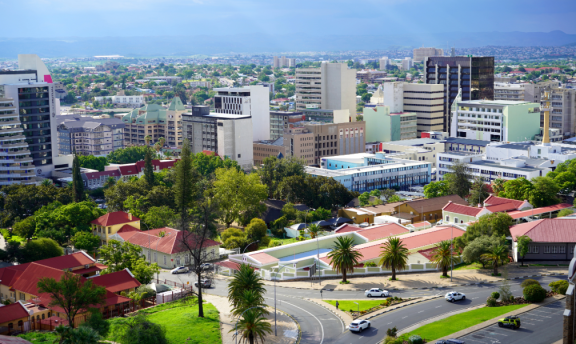
Climate in Namibia: Important information for emigrants
Namibia's climate is subtropical-continental, which means that it is very dry and hot. The intensity of sunshine is very high throughout the year, with almost 300 days of sunshine annually. Namibia is classified as an arid zone, as rainfall is significantly lower than evaporation rates. Only the Caprivi Strip in the north-east of the country has a humid climate, with annual rainfall of up to 650 mm. By comparison, Germany receives an average of 1,000 mm of rainfall per year, while Namibia only receives around 250 mm. All the rain falls almost exclusively in the summer months from November to March and occurs in the form of heavy thundershowers.
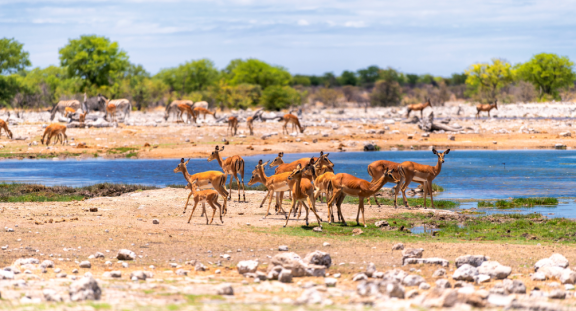
Healthcare system in Namibia: Important facts for emigrants
Namibia offers a hygienic environment, which is particularly beneficial when moving to African countries. Compared to other destinations on the continent, Namibia is known for its cleanliness, which reduces the risk of illness during the move. Nevertheless, the risk of falling ill during your move to Namibia remains higher than at home. Medical care in Namibia is of a high standard, especially in larger cities such as Windhoek or Swakopmund, where hospitals and doctors are easily accessible. Helicopters are often used for accidents in remote areas, as the distances are often too great for ambulances. Before moving to Namibia, you should contact a competent medical facility such as a hospital, your family doctor, a tropical institute or the health department to have your vaccination record checked.

Emigrating to Namibia: An overview of the economic situation and quality of life
In Namibi, the gross domestic product per capita amounted to 5,031.12 US dollars in 2022. The Gini coefficient of wealth describes the distribution of wealth. The indicator is an established, internationally comparable measure of wealth inequality. It is measured on a scale from zero to one. The higher the value, the greater the inequality. The Gini coefficient in Namibia is expected to be 0.58 in 2024 (source: Statista).
Namibia offers many special features that make it an attractive destination for emigrants, investors and the self-employed. These include political stability, a low crime rate and a pleasant climate. The cultural links with Germany also help German-speaking immigrants to quickly feel at home: There is a German community of around 20,000 native speakers, German schools, bakeries and daily newspapers - even the beer is brewed according to the German purity law. The low cost of living and tax advantages, such as the withholding tax principle, no capital gains, gift or wealth taxes and the double taxation agreement with Germany, also make Namibia interesting from a financial perspective. For people who want to emigrate to Namibia, these factors are often decisive, as they offer a comfortable and economically attractive basis for living.
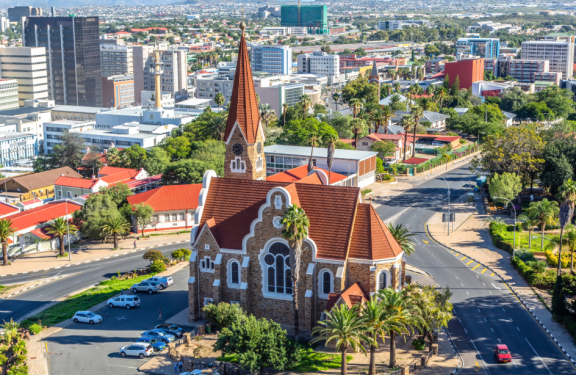
National holiday
Independence Day
Big Daddy Dune - Sossusvlei in the Namib Desert
The highest sand dunes in the world are located in Namibia in the Namib Desert. They surround a dried-up salt lake called Sossusvlei, which is only filled with water in rare and particularly rainy periods, sometimes up to several meters deep. The highest dune in the Namib Desert is nicknamed "Big Daddy Dune".
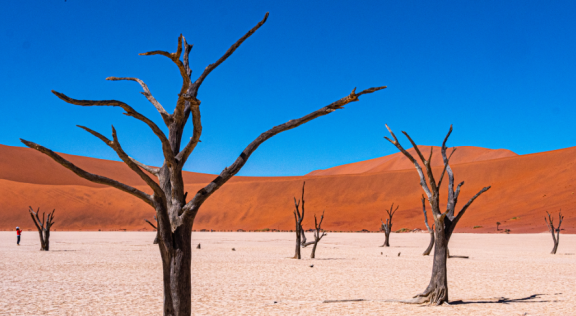
Emigrate to Namibia - Entry Requirements
Entry is possible for German nationals with the following documents:
- Passport: Yes
- Temporary passport: Yes
- Identity card: No
- Temporary identity card: No
- Children's passport: Yes
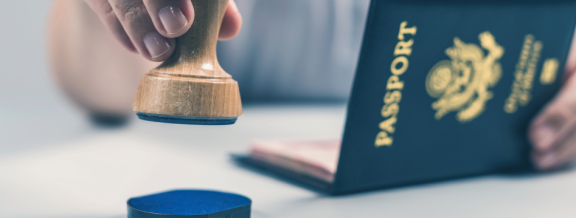
FAQs for emigrating to Namibia
Where can I find relevant information about my country of entry and the entry regulations that apply there?
We have compiled destination country information as well as entry requirements and customs information for many countries in the Relocation Service section of our website and are constantly expanding this section.
Can I use my own container that I already own for the move with DACHSER & KOLB?
For every removal, which we at DACHSER & KOLB always offer as a door-to-door (full service) removal, a container is rented for the duration of the removal. We therefore do not offer the option of using your own container.
Who is responsible for my move abroad and the services I need there?
As a FIDI member, we work abroad with selected, long-standing partners who work in accordance with our service standards.
Are my removal goods insured in the event of damage?
For every overseas move, we naturally cover transportation insurance at current value for the used household goods and personal belongings
What types of transportation do you offer for overseas relocation?
It is generally possible to carry out overseas removals via air freight or sea freight. In the case of sea freight, it is possible to ship the removal goods as additional cargo (“LCL shipment” with Liftvan) or with a container (FCL shipment in 20 feet, 40 feet or 40 feet high cube). We will be happy to discuss which option is best for you in a personal consultation.
When and how must the move be paid for and what is the payment deadline?
You will receive an invoice a few weeks after placing the order and pay the full amount directly in advance.
Do I have to pay taxes and customs duties on my removal goods?
Removal goods can be imported tax and duty-free into most countries if you have a valid residence permit. We will be happy to check the options for importing the removal goods for your desired destination country in a personal consultation.
Are you interested in moving to Namibia or another destination country?
Then do not hesitate and contact us today.
Alexander Brugger
Teamlead Customer Service & Sales - AIR&SEA



